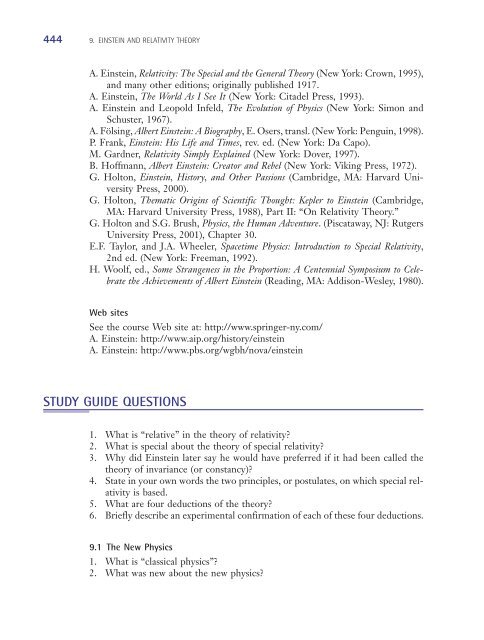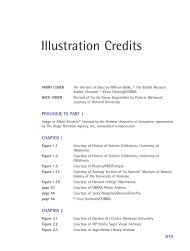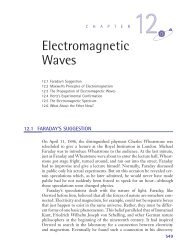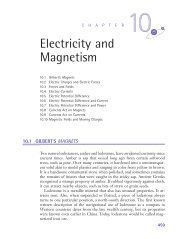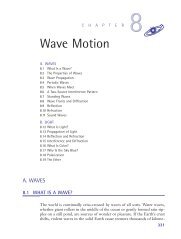Chapter 9: Einstein and Relativity Theory (319 KB) - D Cassidy Books
Chapter 9: Einstein and Relativity Theory (319 KB) - D Cassidy Books
Chapter 9: Einstein and Relativity Theory (319 KB) - D Cassidy Books
You also want an ePaper? Increase the reach of your titles
YUMPU automatically turns print PDFs into web optimized ePapers that Google loves.
3637_<strong>Cassidy</strong>TX_09 6/14/02 12:09 PM Page 444<br />
444 9. EINSTEIN AND RELATIVITY THEORY<br />
A. <strong>Einstein</strong>, <strong>Relativity</strong>: The Special <strong>and</strong> the General <strong>Theory</strong> (New York: Crown, 1995),<br />
<strong>and</strong> many other editions; originally published 1917.<br />
A. <strong>Einstein</strong>, The World As I See It (New York: Citadel Press, 1993).<br />
A. <strong>Einstein</strong> <strong>and</strong> Leopold Infeld, The Evolution of Physics (New York: Simon <strong>and</strong><br />
Schuster, 1967).<br />
A. Fölsing, Albert <strong>Einstein</strong>: A Biography, E. Osers, transl. (New York: Penguin, 1998).<br />
P. Frank, <strong>Einstein</strong>: His Life <strong>and</strong> Times, rev. ed. (New York: Da Capo).<br />
M. Gardner, <strong>Relativity</strong> Simply Explained (New York: Dover, 1997).<br />
B. Hoffmann, Albert <strong>Einstein</strong>: Creator <strong>and</strong> Rebel (New York: Viking Press, 1972).<br />
G. Holton, <strong>Einstein</strong>, History, <strong>and</strong> Other Passions (Cambridge, MA: Harvard University<br />
Press, 2000).<br />
G. Holton, Thematic Origins of Scientific Thought: Kepler to <strong>Einstein</strong> (Cambridge,<br />
MA: Harvard University Press, 1988), Part II: “On <strong>Relativity</strong> <strong>Theory</strong>.”<br />
G. Holton <strong>and</strong> S.G. Brush, Physics, the Human Adventure. (Piscataway, NJ: Rutgers<br />
University Press, 2001), <strong>Chapter</strong> 30.<br />
E.F. Taylor, <strong>and</strong> J.A. Wheeler, Spacetime Physics: Introduction to Special <strong>Relativity</strong>,<br />
2nd ed. (New York: Freeman, 1992).<br />
H. Woolf, ed., Some Strangeness in the Proportion: A Centennial Symposium to Celebrate<br />
the Achievements of Albert <strong>Einstein</strong> (Reading, MA: Addison-Wesley, 1980).<br />
Web sites<br />
See the course Web site at: http://www.springer-ny.com/<br />
A. <strong>Einstein</strong>: http://www.aip.org/history/einstein<br />
A. <strong>Einstein</strong>: http://www.pbs.org/wgbh/nova/einstein<br />
STUDY GUIDE QUESTIONS<br />
1. What is “relative” in the theory of relativity<br />
2. What is special about the theory of special relativity<br />
3. Why did <strong>Einstein</strong> later say he would have preferred if it had been called the<br />
theory of invariance (or constancy)<br />
4. State in your own words the two principles, or postulates, on which special relativity<br />
is based.<br />
5. What are four deductions of the theory<br />
6. Briefly describe an experimental confirmation of each of these four deductions.<br />
9.1 The New Physics<br />
1. What is “classical physics”<br />
2. What was new about the new physics


